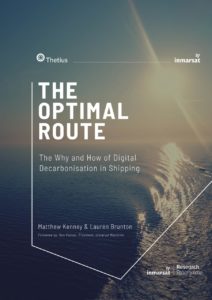4 April 2022 – The Optimal Route report examines strategies to reduce greenhouse gases in shipping, offers guide to decarbonisation role of digital technologies.
Inmarsat, the world leader in global, mobile satellite communications, has published a new decarbonisation report exploring the impact digital technology can make on shipping’s greenhouse gas (GHG) emissions. Compiled by maritime innovation consultancy Thetius, and sponsored by the Inmarsat Research Programme, The Optimal Route – The Why and How of Digital Decarbonisation in Shipping provides evidence that digital optimisation offers a key strategy for owners set on meeting International Maritime Organization (IMO) CO2 targets for 2050.

Opening by identifying three key digital steps to achieve their decarbonisation objectives, the report recommends that shipowners ‘Know your numbers’ as Step 1 in the process. Owners should be in a position to measure vessel performance against metrics including the Carbon Intensity Index (CII) and the Energy Efficiency Existing Ship Index (EEXI). Based on the findings, Step 2 recommends developing a roadmap for decarbonisation, to include a flexible approach to asset purchasing and development. Step 3 advises owners to participate in green corridor schemes to gain access to favourable ship finance.The report goes on to outline the industry’s ‘pathway to 2050’, highlighting the policy-based initiatives that will play the most significant role in guiding shipping towards decarbonisation. These include ‘Just-in-time clauses for voyage charter parties 2021’; the Poseidon Principles ship finance charter, which seeks to encourage financial institutions to invest in greener vessels; global maritime carbon levies to accelerate the uptake of zero-carbon fuels; and the Sustainable Shipping Initiative’s ‘beyond compliance’ scheme.“New regulations and changes to the way cargo owners are selecting transport partners mean that ‘business as usual’ is no longer an option and this report from Inmarsat and Thetius demonstrates a positive way forward for shipowners,” said Ben Palmer, President at Inmarsat Maritime. “Shipping lines that act decisively on digitalisation and decarbonisation will move ahead; those that don’t will be frozen out of preferential financing, green incentive schemes and the most lucrative charter and cargo carriage agreements.”Technology itself is also a focus, with several software tools developed to enhance shipping efficiency described in detail. According to the report, software that facilitates the remote execution of surveys and inspections, training and certification, and vessel pilotage can support environmentally friendly operations, as can those enabling paperless trade and voyage optimisation.In its concluding chapter, ‘Spotlights on success’, the report further explores some of the applications featured, presenting case studies to highlight the way performance management platforms can be used to offer significant reductions in GHG emissions.“We need to act now to decarbonise the world fleet but alternative fuels won’t be available at a large enough scale for at least ten years,” commented Nick Chubb, Founder and Managing Director at Thetius. “Digitally-driven optimisation is the only tool we have to improve carbon intensity that is available today and can be quickly scaled to every ship.”To download the report please visit www.inmarsat.com/en/insights/maritime/2022/optimal-route.html
About Inmarsat
Inmarsat is the world leader in global, mobile satellite communications. It owns and operates the world’s most diverse global portfolio of mobile telecommunications satellite networks, and holds a multi-layered, global spectrum portfolio, covering L-band, Ka-band and S-band, enabling unparalleled breadth and diversity in the solutions it provides. Inmarsat’s long-established global distribution network includes not only the world’s leading channel partners but also its own strong direct retail capabilities, enabling end to end customer service assurance.
The company has an unrivalled track record of operating the world’s most reliable global mobile satellite telecommunications networks, sustaining business and mission critical safety & operational applications for more than 40 years. It is also a major driving force behind technological innovation in mobile satellite communications, sustaining its leadership through a substantial investment and a powerful network of technology and manufacturing partners.
Inmarsat operates across a diversified portfolio of sectors with the financial resources to fund its business strategy and holds leading positions in the Maritime, Government, Aviation and Enterprise satcoms markets, operating consistently as a trusted, responsive and high-quality partner to its customers across the globe.
For further information, follow us: Twitter | LinkedIn | Facebook | YouTube | Instagram.
